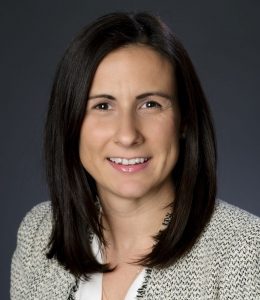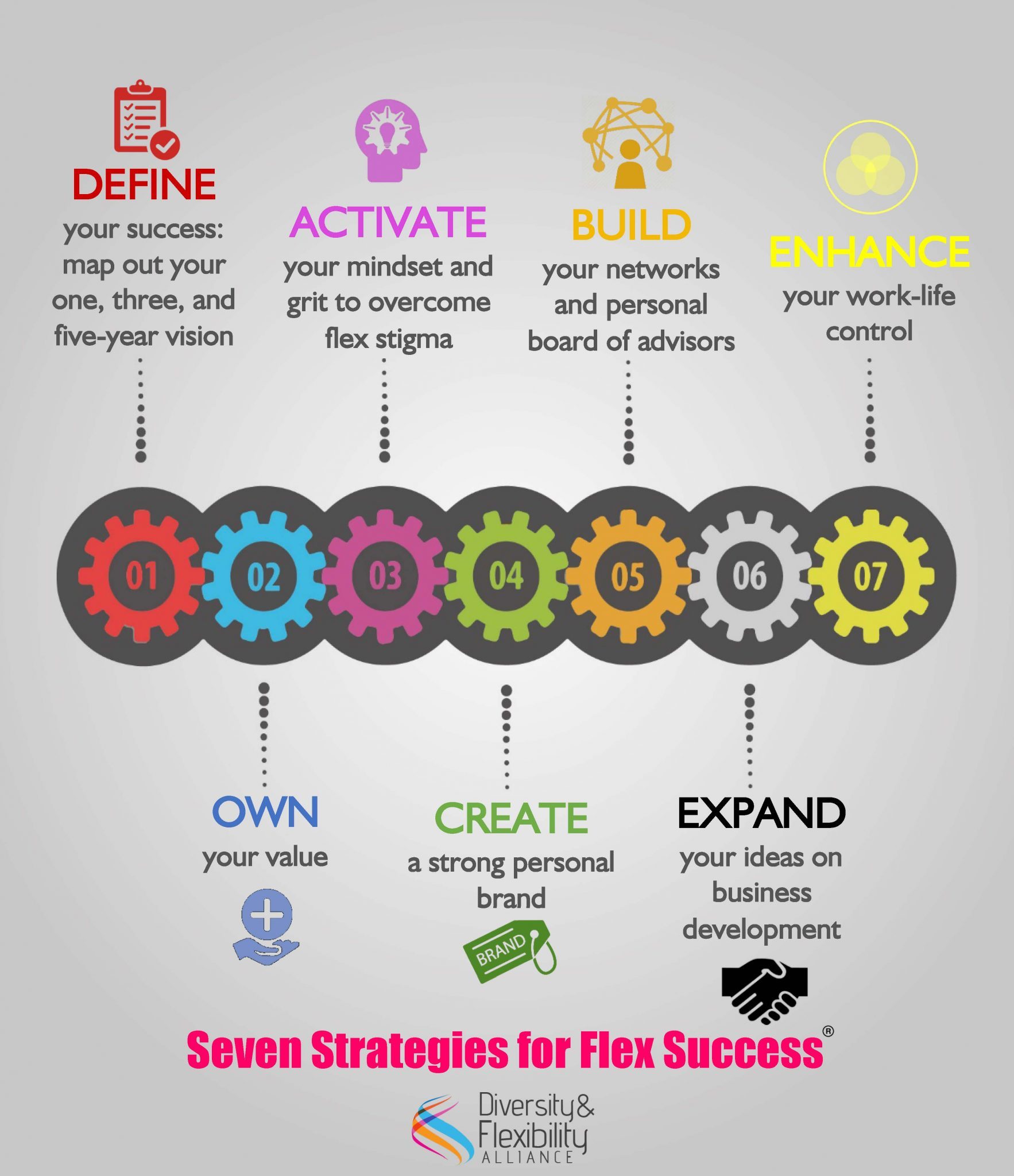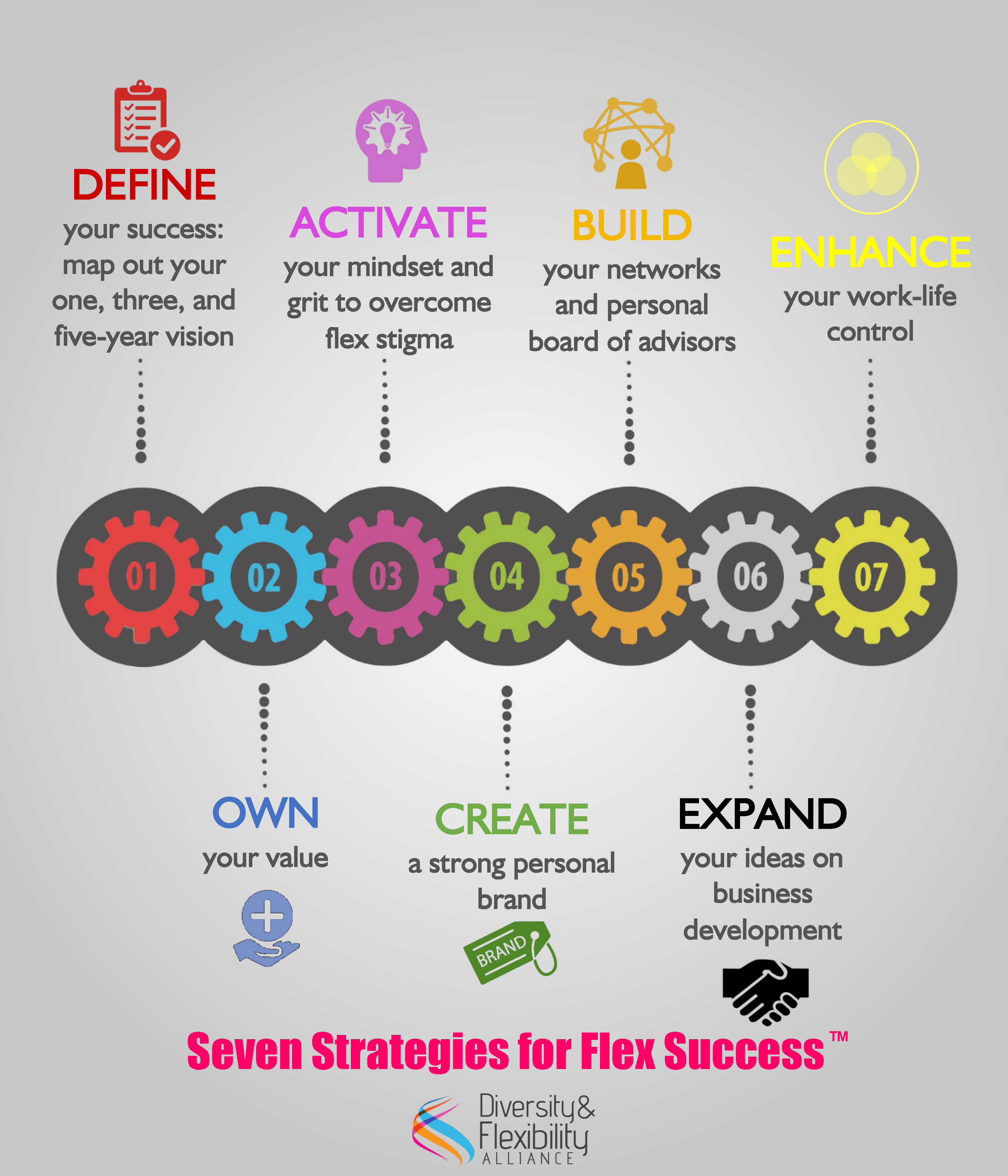Our Spotlight on Flex showcases professionals from member organizations who exemplify personal and professional success while working a flexible schedule. Their stories illustrate the long-term benefits that flexible schedules offer to both individuals and organizations.
April 2020 Spotlight on Flex
For April 2020, we are pleased to share insights from Erin Howell, Counsel, Hogan Lovells (New York).
Diversity & Flexibility Alliance: How have you made flexibility a priority and a success with your schedule?
 Erin Howell: Ever since I was a junior lawyer, flexibility has always been important to me. I started my career as an insurance regulatory associate at Dewey & LeBoeuf, in 2008 just as the economic downturn hit. The firm started offering partially paid sabbaticals to attorneys. I used that opportunity in 2011 to evaluate my career and figure out what my next steps were going to be. At the time, I had three young step-children, and my sabbatical was a great way to spend time together as a family and figure out my next steps. As you can imagine, working for a firm on the verge of bankruptcy is not pleasant and highly stressful; I wasn’t busy, I wasn’t developing professionally the way I wanted to, and it made me doubt if the practice of law was right for me. It took me the better part of my sabbatical (I used nine months of the allotted 12) to figure out if I wanted to stay in big law or do a complete career overhaul.
Erin Howell: Ever since I was a junior lawyer, flexibility has always been important to me. I started my career as an insurance regulatory associate at Dewey & LeBoeuf, in 2008 just as the economic downturn hit. The firm started offering partially paid sabbaticals to attorneys. I used that opportunity in 2011 to evaluate my career and figure out what my next steps were going to be. At the time, I had three young step-children, and my sabbatical was a great way to spend time together as a family and figure out my next steps. As you can imagine, working for a firm on the verge of bankruptcy is not pleasant and highly stressful; I wasn’t busy, I wasn’t developing professionally the way I wanted to, and it made me doubt if the practice of law was right for me. It took me the better part of my sabbatical (I used nine months of the allotted 12) to figure out if I wanted to stay in big law or do a complete career overhaul.
I was fortunate because a small group from Dewey was leaving for Hogan Lovells, and right before Dewey declared bankruptcy, I lateraled to Hogan’s corporate group in 2012. I wanted to really understand if practicing at a large firm was for me. There were parts of working in big law that I really enjoyed, and I wanted to build on those experiences. I broadened my practice and transitioned from doing regulatory insurance work to corporate M & A at Hogan.
I started as a full time associate at Hogan until I had my son in 2015. I remember being on leave, staring at my newborn, and feeling angst over billing 2000 hours a year – when was I going to see my family? How was I going to make this all work? I had nothing to lose by asking for reduced hours, so I went for it. But first, I did my research. I had a friend who made partner while working reduced hours at another firm, so I wanted to know what worked for her. She gave me great advice. First, she told me if I wanted true, meaningful “balance” to ask for 50% – 70% reduced hours and increase my hours later if that felt right. She also told me to be as flexible as possible in terms of availability. With that in mind, I found what worked best for me was a 2/3 schedule where I worked every day; two days a week were full time in the office, and the other three were half days from home. I also found that working in the afternoon was better for my practice than working in the morning. It didn’t make sense for me to take every Friday off because you can’t anticipate when an issue will come up. It’s easier to say, “I can get back to you in a few hours,” versus “I can get back to you in a few days.”
I remained on this schedule until last year. Now that my son is in pre-school, I have increased my hours to around 75 – 80%, and I work Monday and Thursday in the office, Tuesday is a full day at home, and Wednesday and Fridays are half days. That changes depending on what’s needed that week; when I have a deal pending, a 30 hour work week is not feasible. But things balance out later once the deal is done.
What I really appreciate about Hogan is that I didn’t propose a specific schedule when I first asked to work flexibly; I just asked to work part time with some days at home. I wanted to have availability across the week, and together, we developed my schedule. The buy in from my partners also gave me the confidence that I could make my flex schedule work.
DFA: How have the firm and/or clients contributed to your Flex Success®?
EH: In general, I don’t mention my schedule to clients. I want their experience with me to be seamless. On the days I work from home, I forward my calls to my cell phone so it’s just like I’m in the office. That being said, the time I’ve carve out for my family is no different from time I have committed to another client or anything else that’s important. Sometimes an urgent client need requires me to call in back-up to help with my kids. Sometimes the client need isn’t urgent, and it can wait. The general rule I apply is, “Would I reschedule a commitment to another client for this?” Sometimes the answer is yes, sometimes it’s no. I’ve had situations where the conversation naturally leads me to mentioning that I work reduced hours and three days a week from home. My clients are always surprised because they have no idea. One of my female clients said to me, “Thank God – I was wondering how you managed your work and four kids at the same time.” It goes to show that clients are no different than the attorneys; we’re all struggling with the same issues.
From the firm’s perspective, I was elevated to counsel while working a flex schedule. That made two things very clear to me: 1) Hogan supported my choices and flexibility, and 2) the firm has always been open about the advancement process and how my decisions would or would not impact my advancement. My experiences and career path may be a little different than my full time peers, but I always knew what my path would look like. The firm made it easy for me to make educated decisions about my next steps. I’m okay with my path taking a little longer because it’s the one I chose; it feels right to me while I’m traveling on it. The point is to have honest and continuous conversations about your career with firm leadership. This has been a key to my success and feeling good about the choices I’ve made.
DFA: How has working flexibly made your career more sustainable and contributed to business/professional development opportunities?
EH: For me, the biggest benefit was my availability – both as a parent and at work. I’m fully present and engaged when I’m with my family and when I’m at work. That extra energy has allowed me to explore other avenues of networking and build client relationships. If you don’t have “energy” to foster professional relationships, then it’s really hard to take your career to the next level. Flexibility allows me to really focus both on my life and career and not burn out. This schedule is key – it helps me avoid burnout.
DFA: Looking back, would you do anything differently, or what would you tell your younger self?
EH: I would tell my younger self the same thing I tell junior associates now who are struggling with the same issues – trust the process, especially when you’re a new parent and returning to work. Trust that you’ll figure it out. Everyone has ups and downs with their work flow. It’s hard to remember when you’re busy that you’ll be able to spend more time with your family when it slows down again, and vice versa. Things will pick up again even when it’s slow. Trusting in the process takes the pressure off.
DFA: How do you recharge, and how do you pay it forward?
EH: I’ve found that my entire life is better and runs smoother when I take care of myself the same way I take care of my kids – making sure I eat well, get plenty of sleep, and stay active. I also try to take care of myself physically and mentally by trying to “unplug” for about 30 minutes a day. It makes a big difference and is essential to having a “balanced” life. Running and yoga also help keep things in perspective for me.
I’m an active formal and informal mentor at the firm too. I talk to everyone who asks about what’s worked and what hasn’t for me when it comes to flexibility. Associates coming up the ranks now are much more assertive about asking for what they want. My story is the common one – I came back from maternity leave and decided to work part time. But now I see more people who want flexible work options others than for childcare/family reasons. They don’t want to burn out, they want a different lifestyle, or they just want time to pursue other interests outside of the office. To me, these choices are they key to widespread success of alternative work arrangements. The more people who can do this, and do it well, the more that firms, clients, and in-house legal departments will see that “always on” is not the only model for success.
Outside the firm, I pay it forward by being able to approach others in my life with more energy and focus. I can attend my youngest son’s school activities. My other three kids are teenagers, and being home for them is more important now than it was when they were toddlers.
Sometimes when I’m pushing to sign a deal and working long hours, I wonder if I’d be happier in a different career. But then I take a step back, and honestly, working 80% at a law firm is comparable to working full time in another field. I have so much flexibility that I wouldn’t have in another role. Even during times when I’m billing 50+ hours a week, I can still attend my son’s Mother’s Day tea party at his school. I still have control over my schedule and can decide how to spend my hours and allocate my resources. That autonomy is so important to me, and it’s one of the reasons why I stay in big law. You have to know yourself and know what’s important to you. It’s not predictable, and it’s not always easy, but for me, it’s worth it.

 For March 2020, we are pleased to share insights from Kate Saracene Partner,
For March 2020, we are pleased to share insights from Kate Saracene Partner,  Danielle Katzir, a Partner in the Los Angeles office of Gibson Dunn & Crutcher, has worked a 75-85% annualized schedule since 2010, allowing her to take shorter days and weeks in between busier periods. In recent years, Danielle has worked on corporate and tax transactions and is now recognized as a national expert on EB-5 Visa matters. Her Pro Bono work has included representing an Afghan family in the wake of the recent travel ban. Danielle is a member of her firm’s Professional Development Committee and Diversity Committee, and is deeply committed to mentoring young attorneys and maintaining an inclusive organizational culture.
Danielle Katzir, a Partner in the Los Angeles office of Gibson Dunn & Crutcher, has worked a 75-85% annualized schedule since 2010, allowing her to take shorter days and weeks in between busier periods. In recent years, Danielle has worked on corporate and tax transactions and is now recognized as a national expert on EB-5 Visa matters. Her Pro Bono work has included representing an Afghan family in the wake of the recent travel ban. Danielle is a member of her firm’s Professional Development Committee and Diversity Committee, and is deeply committed to mentoring young attorneys and maintaining an inclusive organizational culture. Stacy Bunck, Kansas City Office Managing Shareholder at Ogletree Deakins, began a reduced hours schedule in 2010 after returning from a six-month parental leave. After working a 60% schedule for seven years while her children were young, she increased her hours target to 75%. In January 2014, Ms. Bunck was elevated to Shareholder and in 2018, she became the Office Managing Shareholder for Ogletree’s Kansas City office. She is the first person in the history of Ogletree to ascend to Office Managing Shareholder while on a reduced hours arrangement, an arrangement she has continued to maintain in her Office Managing Shareholder role. In addition to performing her leadership role, Ms. Bunck has co-chaired four jury trials while working a reduced hours schedule. She has also participated in the 2019 Ogletree Deakins Leadership Challenge Program and serves as a role model and mentor for other attorneys pursuing reduced hours schedules.
Stacy Bunck, Kansas City Office Managing Shareholder at Ogletree Deakins, began a reduced hours schedule in 2010 after returning from a six-month parental leave. After working a 60% schedule for seven years while her children were young, she increased her hours target to 75%. In January 2014, Ms. Bunck was elevated to Shareholder and in 2018, she became the Office Managing Shareholder for Ogletree’s Kansas City office. She is the first person in the history of Ogletree to ascend to Office Managing Shareholder while on a reduced hours arrangement, an arrangement she has continued to maintain in her Office Managing Shareholder role. In addition to performing her leadership role, Ms. Bunck has co-chaired four jury trials while working a reduced hours schedule. She has also participated in the 2019 Ogletree Deakins Leadership Challenge Program and serves as a role model and mentor for other attorneys pursuing reduced hours schedules.


 No matter what industry you’re in, it’s always a good idea to stay one step ahead of your business, your clients, your customers or your marketplace. You always want to be thinking about tomorrow and where your career is headed and where your income is coming from. While you might approach business development in a slightly different manner in light of your flexible schedule, it’s still imperative that you dedicate time to business development and to generating your future revenue.
No matter what industry you’re in, it’s always a good idea to stay one step ahead of your business, your clients, your customers or your marketplace. You always want to be thinking about tomorrow and where your career is headed and where your income is coming from. While you might approach business development in a slightly different manner in light of your flexible schedule, it’s still imperative that you dedicate time to business development and to generating your future revenue.

